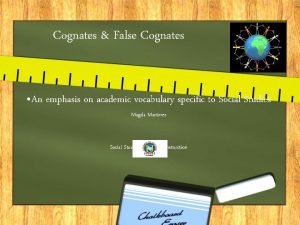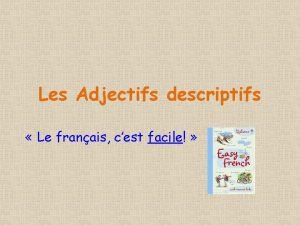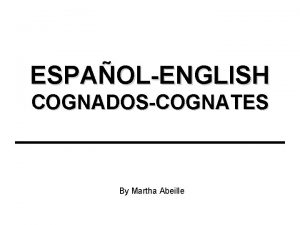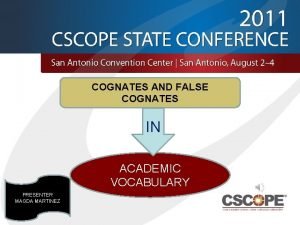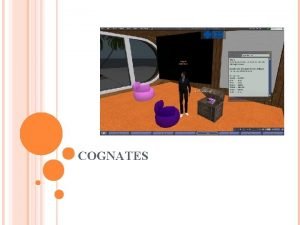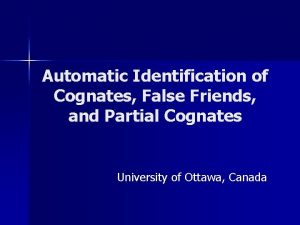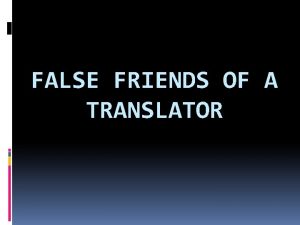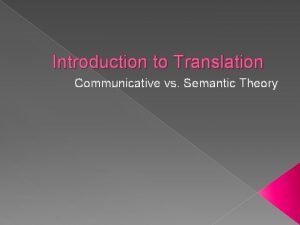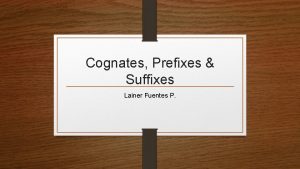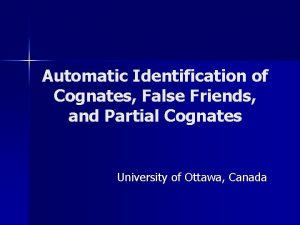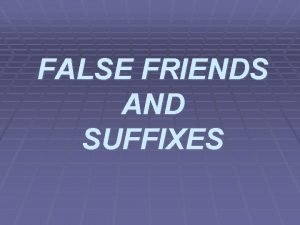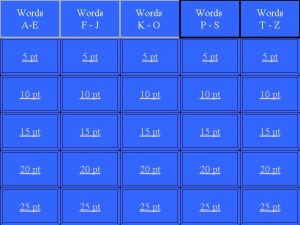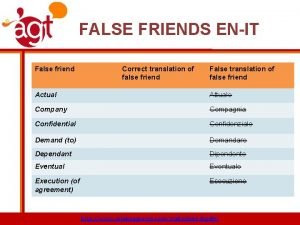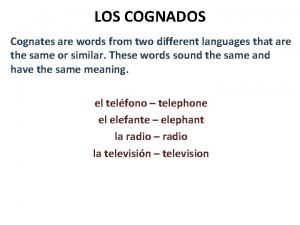TRANSLATION OF PSEUDOINTERNATIONAL WORDS FALSE COGNATES False cognates





















- Slides: 21

TRANSLATION OF PSEUDO-INTERNATIONAL WORDS (FALSE COGNATES) False cognates or pseudo-internationalisms are words in SL that usually come from Latin or Greek and have similar or exact spelling in TL but differ in meaning, giving a false idea of its real meaning. There also are the real cognates, which have similar spelling and meaning.

The rabbit was lying in a depression between two clods. There were attempts to sabotage key services in Santiago. We are told that BBC television this autumn will give a massive coverage to the general election. Benches gleamed empty and crimson under the light, their occupants having gone to tea. Her progress about London during that first week was one thrilling adventure. Once upon a most early time there was a Neolithic man.

NON-EQUIVALENTS Non-equivalents are SL words which have no corresponding lexical units in the TL vocabulary. The absence of equivalents may be explained by Ш extralinguistic reasons Ш linguistic reasons.

Non-equivalents may be divided into two groups. The first group consists of words denoting referents unknown in the target language – things, objects, notions, features of national life, customs, habits. The second group embraces words which for some linguistic reason have no equivalents in the target language, the so-called linguistic lacunae.

The first group consists of words denoting referents unknown in the target language – things, objects, notions, features of national life, customs, habits, etc. The words of this group bear a distinctly national character and are tied up with the history of the people speaking that language, the growth of its culture, its way of life and traditions. Cultural discrepancy accounts for the appearance of words which are untranslatable in the literal sense of the word. There are different ways of rendering these words in translation and of overcoming the so-called “barrier of untranslatability” (cultural untranslatability). The words belonging to this group cover a wide range of denotata, e. g. speaker, parliament, public school, landslide, coroner, teach-in, drive-in, know-how, striptease, brain drain, backbencher, grill-room, as well as titles of politeness, etc.

The second group embraces words which for some linguistic reason have no equivalents in the target language, the so-called linguistic lancunae, e. g. privacy, involvement, glimpse, conservationist, environmentalist, oralist, readership, riser, bedder, vote-getter, statehood, etc.

Translation of Non-Equivalents There are three ways of rendering non-equivalents in translation. By Borrowings The borrowed words may be either transliterated or transcribed, e. g. ale -эль, roastbeef - ростбіф, sweater - светр (transliterated borrowings). speaker - спікер, know how - ноу-хау, establishment - истэблишмент (transcribed borrowings). The latter principle is, as seen from the above examples, applicable to the rendering of neologisms. By translation loans House of Commons - Палата Громад, brain trust - мозковий трест. By Descriptive or Interpreting Translation Landslide - перемога на виборах з величезною перевагою голосів; a stringer (америк. ) - частково зайнятий кореспондент, праця якого оплачується з розрахунку кількості слів; a conservationist (environmentalist) - людина, заклопотана забрудненням або знищенням довкілля.

NEOLOGISM is a newly coined term, word, or phrase, that may be in the process of entering common use, but has not yet been accepted into mainstream language. Neologisms are often directly attributable to a specific person, publication, period, or event. genocide (1943) political correctness (1970) Californication (1970 s) heterosexism (1979) glocalisation (1980 s) Republicrat (1985) Islamophobia (1991) soccer mom (1992) fauxtography (1996) red state/blue state/swing state (c. 2000) corporatocracy (2000 s) Islamofascism (2001) Chindia (2004) NASCAR dad (2004) datagogy

Translation of Neologisms There also three ways of rendering neologisms in translation. By Borrowings By borrowed words may be either transcribed or transliterated. E. g. hippy – хиппи; smog – смог. It should be noted that transcription of such words is not always exact, e. g. nylon – нейлон; laser – лазер. By Translation Loans Neutron bomb – нейтронная бомба. By Descriptive or Interpreting Translation Feedback – обратная связь, activism – агитационная деятельность, bugging – тайное наблюдение с помощью технических средств. In some cases neologisms may be regarded as non-equivalents and translated accordingly.

Phraseological Units Phraseological units are usually classified into three big groups: Ш phraseological fusions, Ш phraseological unities, Ш phraseological collocations.

Phraseological fusions are non - motivated groups forming indivisible wholes both semantically and syntactically. Their meaning in Modern English does not depend on the meaning of the component elements. They are usually rendered by interpreting translation or by paraphrasing, e. g. to paint the lily - намагатися поліпшити або прикрасити что-л. , що не потребує поліпшення або прикраси; займатися безплідною справою; витрачати час або сили даремно. To show the white feather - здрейфити, виявити боязкість. The meaning of a phraseological fusion may naturally be rendered by different synonyms, e. g. to go the whole hog робити что-л. грунтовно, проводити до кінця, не зупинятися на півзаходах, йти на усе.

Phraseological unities are motivated units of Modern English; their components are not semantically bound. They are often figurative and the transference of meaning is either metaphorical or metonymical, e. g. to drop a brick - допустити нетактовність, зробити ляпсус, промах; monkey business - всякі штучки, фокуси, дурощі; to eat humble pie - проковтнути образу, змиритися. This group of phraseological units is heterogeneous and comprises proverbs, proverbial sayings, allusions, euphemisms, professionalisms. Little pitchers have long ears - дeти люблять слухати розмови дорослих; What will Mrs. Grundy say? - Що скажуть люди? Phraseological unities differ by their structure, by their syntactical function in a sentence and by their stylistic features.

According to the principle of their translation phraseological unities can be divided into three groups: Ш Phraseological unities having Ukrainian counterparts, which have the same meaning expressed by a similar image. They can often be traced to the same source - biblical, mythological, Latin proverbs or sayings, e. g. a living dog is better than a dead lion (bibl. ) - живий пес кращий за мертвого лева; not all is gold that glitters - не все те золото, що блищить; to cut the Gordian knot (myth. ) - розрубати гордіїв вузол. Ш Proverbs and Proverbial Sayings having the same meaning but expressing it by a different image. Too many cooks spoil the broth. - У семи няньок дитя без оку. To buy a pig in a poke - Купити кота в мішку. Ш SL phraseological unities sometimes have synonymous TL equivalents , the choice is open to the translator and is usually determined by the context, e. g. Between the devil and the deep sea - між двох вогнів, між молотом і ковадлом, між Сциллой і Харибдой, в безвихідному становищі. In the absence of a correlated phraseological unity the translator resorts to interpreting translation, e. g. a skeleton in the closet (cupboard) - сімейна таємниця, прикрість, що приховується від сторонніх.

Target language equivalents possessing national colouring though expressing the same idea should be avoided as they cannot be considered true equivalents because they introduce alien associations and alien national colouring, e. g. to carry coals to Newcastle. In such cases two solutions are possible: a) to preserve the image of the English phraseological unity ніхто не возить вугілля в Ньюкасл; b) b) to resort to interpreting translation - займатися даремною справою.

Phraseological collocations are motivated word combinations but they are made up of words possessing specific lexical valency which accounts for a certain degree of stability in such word groups. They are translated by corresponding collocations in Ukrainian, e. g. to make faces - кривлятися; to make amends приносити свої вибачення; to make a fortune складати статок; to make a bed - застелити ліжко; to make allowances - робити знижку.

There are several ways of rendering phraseological units: Ш full equivalent, Ш partial equivalent, Ш variant equivalent, Ш loan translation, Ш Description.

full equivalent with identical or similar sructure, lexical components, stylistical characteristics, meaning: to read between the lines a Pyrrhic victory a Procrustean bed to cross the Rubicon to clip someone's wings This way of rendering is the most adequate translation although the stylistic meaning is not always the same.

partial equivalent, similar to SL phraseologism in its lexical and stylistic characteristics, but different in lexical and stylistic means used as well as in grammar characteristics: not to see the wood for the trees to play into somebody's hands to make a mountain out of a molehill a hard nut to crack to beat the air to kill two birds with one stone

variant equivalent: rendering with the most adequate (considering context) synonym: to be poles apart to hold one's ground

loan translation of SL phraseologism (used in cases when the translator is sure that it will be understood by readers): to acquire currency – instrument of peace – trial baloon – to have the last word – to get hold of the wrong side of the stick -

description (this way of rendering phraseologisms lacks stylistic meaning): plain as a pikestaff – to bear in mind – acid test – all in all – as matters stand – to hold good – to be beside the point – to go one's own way – to feel one's way – to burn the midnight oil -
 Cognato
Cognato False cognates examples
False cognates examples Pseudo-international words
Pseudo-international words Shrek nationality
Shrek nationality What are cognates?
What are cognates? Bottom-up listening strategies examples
Bottom-up listening strategies examples Example of cognates
Example of cognates What is a cognate?
What is a cognate? Strategy: recognizing cognates
Strategy: recognizing cognates What are cognates?
What are cognates? Cognates in spanish
Cognates in spanish Brown and lee 2015
Brown and lee 2015 Partial cognates examples
Partial cognates examples 102 dr
102 dr ?true:false
?true:false Is in actuality grammatically correct
Is in actuality grammatically correct Semantic theory
Semantic theory Voice translation-rule
Voice translation-rule Linear function transformations
Linear function transformations Noun to noun
Noun to noun Propositional and expressive meaning
Propositional and expressive meaning Content words and function words
Content words and function words

